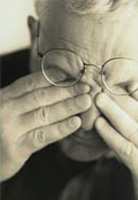People frequently ask the same questions about their cancer experience.
- Did my personality or emotions cause cancer?
- Did the stress I was under alter my immune system and cause my cancer?
- Did grief or a loss cause my cancer, and could it make the cancer come back?
- When I get down and depressed, am I making my tumor grow faster?
- How important is support from others?
- Can support groups help me live longer?
- How can I help make my treatment work?
You may have asked yourself the same question as well. Here are some answers based on what we know, and what we don’t know.
Did my personality or emotions cause my cancer?

Do certain personality traits, a history of adverse childhood experiences, or a particular way of coping with stress make a person more likely to get cancer and to die from it? Conversely, do other personality or coping patterns protect people from getting cancer or help them survive it? We know that personality affects both lifestyle and habits, which may lower or raise your cancer risk.
If you ignore warnings about smoking for example, or continue to engage in other risky health behaviors, you increase your risk of cancer. Another high-risk trait is procrastination in seeing a doctor when you have a symptom, like a persistent cough or bleeding. This is sometimes called the “ostrich” syndrome, which is trying to avoid a problem, or deny that it may exist out of fear.
One theory suggests that people with repressive personalities, who look calm but hold in a cauldron of painful emotions, are more prone to develop cancer. Dr. Lydia Temoshok, a psychologist who led a number of research studies on personality and cancer at the University of California, San Francisco, labeled this type C personality (by the way, the C doesn’t stand for cancer). You are likely to be familiar with the Type A (hostile, impatient) personality and the Type B (docile, passive) personality, which led to a greater or a lesser risk of heart attack. Type C individuals are in between. They have a dramatic physical response to stress, yet they report that they are not highly stressed at all.
Although Temoshok and her colleagues found some differences in cancer risk and survival among Type C patients with melanoma, the general consensus in the scientific community is that there is insufficient evidence to make the leap that if you are Type C, you are more prone to cancer or less likely to survive it than other people.
Another theory suggests that people with a “fighting spirit,” survived longer than those who were stoic or passive. We know today that the primary predictor of survival for women with breast cancer, is whether the cancer has spread to the lymph nodes under the arm. But at the time of their research, scientists did not know this, so in the earlier study, no one checked the lymph nodes to look for cancer spread. Consequently, this critical predictor was not taken into account in the Greer-Watson study. The bottom line? Current knowledge tells us that the strongest factor in survival from breast cancer is the presence or absence of positive nodes for cancer, not the personality of the individual. A “fighting spirit” is surely a helpful way to cope, but we don’t know that it directly influences biological survival.
Over the years, many studies have been conducted to clarify the role of personality in health. The studies have frequently found contradictory or inconclusive results. This is largely because of the difficulty in carefully studying both psychological and physical domains at the same time. It is natural therefore, for people to throw up their hands and say, “They really don’t know what they’re doing,” or “How can they get such conflicting results? They can’t all be right!” Scientists tolerate these differences, recognizing that it takes many studies to gather sufficient information to prove any given fact with certainty.
In conducting research, there is always the question. Did they control all the factors so that no “red herring” could account for the results? This is the only way researchers can be sure that the results are accurate. The best studies today try to avoid these glitches by carefully considering and “controlling” all relevant factors.
Rather than trying to pin cancer risk on certain personality types, research in recent years has explored the role of individual’s coping patterns. How people handle the daily hassles in their life, correlates to how they deal with cancer and its outcome. Certainly, if your personality leads you to go to a doctor quickly with a symptom that might be cancer, you likely get an earlier diagnosis, which will more probably lead to cure. If you procrastinate, cancer may be diagnosed later, at a less curable stage. Other personality traits, such as tenacity and persistence, play a role in determining whether you doggedly hang in to complete the treatment.
The myth of the cancer personality is akin to the tyranny of positive thinking. Jesse, a fifty-one-year-old college professor with Hodgkin’s disease, summed up the controversy this way:
What difference does it make telling me my personality might have given me cancer? It’s like telling me my blue eyes caused cancer. Even if it were true, I can’t change it. Tell me something I can do something about.
Jesse’s right. You can’t change the enduring parts of your personality. However, you can use your ways of coping to advantage by maintaining a healthy lifestyle, seeking care if you have a symptom suggestive of cancer or one that is unexplained for weeks, and hanging in with the treatments if it is cancer.
Did stress alter my immune system and cause me to have cancer?

Many researchers studies have shown that stressful life events, from the death of a loved one to the loss of a job, are linked to an increase in certain health problems, particularly heart disease, diabetes, and hypertension. Many people assume that stress leads to cancer as well. Evidence for this, however, is not clear.
For the time being, there is no proof that the hormonal and mild immune system blips caused by stress influence the onset or progression of cancer.
What we know about stress is that when we are confronted with a frightening situation, we mobilize our brain and our body to deal with it. The acute (immediate) stress response turns on the autonomic (self regulating) nervous system, which controls basic functions like breathing and heart rate; they go on without your thinking about them. Dr. Walter Cannon in the 1920s first described the “fight-or-flight response.” Later, Dr. Hans Selye, the pioneer researcher in stress, termed it the “emergency response,” when he explored the effect on the endocrine (hormonal) and immune systems. The body marshals its hormones and immune system to fight whatever is attacking it, either externally or internally. Parts of the immune system (the white blood cells) are “traffic cops,” whose job is to ward off infection. These cells race to a cut on your arm or an infection in your throat. This positive and critically important part of the stress response gears up the human body for meeting a challenge inside the body.
Studies by Drs. Ronald Glaser and Janice Kiecolt-Glaser of Ohio State University have shown that many different types of stress trigger changes in the immune system. Medical students taking examinations have short-term changes, while people caring for a relative with Alzheimer’s disease have long-term, continuous stress and more prolonged changes in immune function. How do these clearly proven facts relate to cancer? Breast cancer surgery alone causes slight temporary changes in the immune system, but women with higher levels of distress who had the surgery, showed a greater change in some parts of immune function, according to a study by Dr. Barbara Anderson, a psychologist at Ohio State University. Put simply, there’s an immune system blip from surgery alone, but the blip is greater if you are distressed. It is a big leap, though, to go from this finding to saying that stress affects the outcome of breast cancer. Some aspects of the mind-body connection are clear. Emotions affect both hormones and immune function. However, the link between mind-body interactions and cancer is far less clear and remains unproved. There is a vast difference between saying that stress temporarily alters some functions of the immune system and saying that stress, therefore causes cancer.
Dr. Bruce McEwen, a brain researcher at Rockefeller University in New York City, carried this research forward. In an article in the New England Journal of Medicine in 1998, he described a theory of how chronic stress causes “wear and tear” on the body. Stress affects all of us every day, ranging from minor to major events; we react and return to normal. McEwen calls this phenomenon allostasis. He suggested that the psychological changes associated with stress over long periods result in an “allostatic load,” which, simply put, is the wear and tear that makes us more vulnerable to heart disease, non-insulin-dependent diabetes, hypertension, and infections such as the common cold. McEwen’s contribution to this intriguing area is important. He suggests that we can offset this wear and tear and minimize the allostatic load by keeping the body in shape with exercise and nutrition, and by keeping our stress at a tolerable level. If you cope with a crisis by assessing it objectively and staying calm, minimizing psychological stress, you likely reduce the body’s physical stress. If you deal with a crises in that way and rarely panic, you likely have a lower allostatic load, as described by McEwen.
In relation to cancer, however, stress-related changes in the endocrine and immune systems have not, so far, been persuasively linked to increased risk or survival. Studies that have taken into account the known predictors, such as extent of tumor spread and type of treatment, have not found stress to be a major factor. This is not the final word on this subject. The knowledge we have related to this is incomplete, and existing studies do not paint a complete picture.
Did grief or loss cause my cancer, and could it make the cancer come back?

One of the most strongly held beliefs in our society is that depression, grief, or loss of a loved one can lead someone to “die of a broken heart.” Literally hundreds of accounts of such consequences abound, depicting the surviving partner not wanting to live on alone. When a grieving spouse develops cancer, it is assumed that the cancer occurred as a response to the loss.Both the psychological and physical aspects of grief have come under study in recent years. An expert panel was convened several years ago by the Institute of Medicine to look at what is known about grief and its psychological and physical consequences.
This panel of experts reviewed all available studies and confirmed the well-known profound feelings of sadness and loss. But when the reviewers looked at the available studies to determine whether grief increased a person’s vulnerability to disease and death, and particularly death from cancer, the overall evidence was far less compelling. The question remains again as in the previous example of whether or not stress, this time from emotional / psychological grief, can impact the immune system enough to cause this type of illness. Several studies suggest that this is not true, despite findings that grief does, at least transiently, affect the immune system. Twenty years ago, research conducted at Mount Sinai Medical Center in New York and in Australia involved men in the nine months following their wives’ death from breast cancer. The study found that the men had negative changes in some cells of their immune system for a period of several months.
This result led to concern about whether the immune changes would raise the risk for developing cancer in these men and among grieving individuals in general. Several studies have been conducted to determine whether there is greater mortality from cancer among people who have had a significant loss. Researchers from Israel, Denmark, and the United States have examined the impact of losing a spouse or a child, since these are the most significant losses people experience. Ten years after the loss, the surviving spouses and parents had no greater mortality from cancer than those who did not experience a loss during that period.
The studies in Israel and Denmark were of parents who had lost a child. In Israel, the parents had lost sons in battle during the Six Day War or in an accident; in Denmark, the parents had lost children to leukemia. Death rates for these bereaved parents were no greater overall than among those who had not suffered such a loss. Cancer did not appear
more frequently as a cause of death than would normally be expected, suggesting strongly that grief does not increase the risk of getting cancer, despite the enormity of the loss.
This epidemiological data strongly suggests that the transient immune changes found by the Mount Sinai group and others in bereaved individuals, are not sufficient to increase the risk of developing cancer. As intuitive as it feels that grief may make a person vulnerable to cancer, there are as yet no data supporting the notion.
What if you already have cancer? Will a loss cause the cancer to come back or progress? In a study done through a cancer clinical trials group, doctors investigated whether the loss of a spouse or child would cause women who had been treated for breast cancer to have a recurrence sooner or to have a shorter survival time. They conducted a study of several hundred women who had received the same adjuvant chemotherapy treatment with women who had no loss within the same seven years. Unlike some previous studies reporting that a loss led to a recurrence of breast cancer, here the two groups of women were matched on important medical factors known to predict survival (like number of positive nodes under the arm, and estrogen receptor status). There was no difference in recurrence or survival. This is reassuring information for women who have had breast cancer and fear that the loss of someone dear will cause their cancer to begin to grow. You can reassure others of the fact that sustaining a loss doesn’t bring on a return of cancer. Several other studies have now shown similar results.
When I get down and depressed, am I making my tumor grow faster?
The answer, according to most reliable scientific studies, is no. A large study in which people were randomly chosen in several representative cities looked at depressed individuals ten years after they were identified as having either clinical depression or milder symptoms. There was no increased mortality from cancer among them, compared with those who had not experienced depression. This fact, however, is in sharp contrast to the results of research concerning depression and heart disease.
The bottom line, as far as can be determined from studies to this date (2001), is that neither grief, depression, nor depressed feelings increase a person’s risk of developing cancer or progression of a cancer.
How important is support from others?

An intriguing and increasingly important aspect of health is our sense of connection to other people, both at a personal level (with friends and relatives, for example) and at the level of feeling part of a community. At first glance, this subject might appear to have little relation to disease vulnerability or survival, but it is actually emerging as an important factor.
First, it is clear that ties to others affect our health. Many studies have found that both men and women who have more social connections have a lower death rate, from all causes, than is expected for persons their age. But those who are isolated, with little connection to others, have the highest mortality from all diseases. Drs. Peggy Reynolds and George Kaplan, at the University of Michigan, found in a large study that having more social ties was associated with lower mortality, including mortality from cancer, but that being married did not have this affect. Marriage can be a plus or a minus, as today’s divorce rate confirms.
A study of specific aspects of social ties found that involvement in a range of social activities, as well as the quality of relationships and frequency of contacts (not necessarily the numbers of friends or acquaintances), were the most important elements.
How could social support versus isolation affect your health? The first and obvious explanation is that when you have someone who cares about you, you are more likely to get to the doctor when you need to, pay more attention to good diet, and avoid less healthy habits. It may be as simple as that. However, there is little doubt that, when you have someone with whom you can share the burden of your illness, it comes less threatening and you feel a greater sense of control and confidence than if you were alone. More social support and contacts may lower your distress, therefore, and help you cope better with illness. While we don’t know how social ties are translated into an effect on survival, the evidence that can have an effect at all, seems clear and compelling enough to make researchers want to study them more.
It’s important to keep in mind that if you tend to have few social connections and function well that way, it’s likely a long-held pattern that has worked for you and one to which your body has adapted over many years. Still, if you’re comfortable socializing or can overcome shyness, a good “prescription” might be to try to develop ties to a few people. Volunteering for a charity, belonging to a club, organization, or religious group fulfills this need for many people. In these new days of emails and Internet connections, participating in forums, and communicating with people with like experiences may be a solution. Friendships can grow out of all these types of contacts.
The bottom line is this: Positive involvement with others appears important in helping you to maintain good health habits and living longer.
Can support groups help me live longer?
Groups have become popular as a means of support among patients. They got an enormous boost in 1989 when Dr. David Spiegel, a psychiatrist at Stanford University, reported a ten-year study showing that women receiving standard treatment for metastatic breast cancer who had participated in group therapy lived longer by an average of eighteen months. The study was not originally designed to look at survival, and the women were never told that group sessions might influence their survival. Published in the British medical journal Lancet, this study created a great stir in the medical community and among patients. People with cancer began to seek out groups more actively, and some professionals suggested that support groups be included (and covered by insurance) as part of standard cancer treatment. The study turned out to be a great stimulus for the popularization of group support for patients and for research into group therapies.
These were results that everybody wanted to hear: patients, families, mental health workers, and oncologists. If group therapy could not only improve quality of life, but also help people to live longer, there could not be better news. The study awaits replication by Spiegel and others to confirm that groups can affect both quality of life and survival. Since it is difficult to control all factors, questions have to be raised as to whether some factor not considered in the study might have influenced the positive result found by Spiegel.
A second study, by Drs. Fawzy, a husband-and-wife research team at UCLA, found that patients with malignant melanoma benefited psychologically from group sessions following surgery, focused on giving patients information about their disease and providing emotional support for them. Five years later, of the thirty-five patients studied, those who participated in the group shortly after their diagnosis were disease-free longer and survived longer overall. The longer-term survival (ten years or more) has not been reported. Research is needed to confirm these findings, particularly since so few patients were studied.
In two other studies, patients participating in support groups did not live longer. Dr. Bernie Siegel, who started the Exceptional Cancer Patient (ECAP) program, and investigators at the Bristol Clinic in England, found similar negative results.
There are a variety of groups available today such as the Wellness Community, Gilda’s Clubs, and disease specific foundations (like OCF) who provide information and a chance for patients and survivors to communicate with each other. They do a tremendous job of improving life for patients. We know that groups can improve quality of life and decrease distress for many patients, but the jury is still out regarding their effect on lengthening life.
How can I help make my treatments work?
How can you use this information about the mind-body connection in your own care? First, you must be wondering what you can really believe. This is understandable; it was mentioned earlier that there are believers and nonbelievers in the mind-body connection. People vary in how much store they place in any psychological research. Nonbelievers consider such research “touchy-feely”; believers care less about data because they feel certain that the connection exists. What we have tried to present here is a balanced view of this most controversial aspect concerning psychological issues in cancer.
The best advice for patients right now, is to take a rational and reasoned approach, one with balance. Take news reports regarding new studies with a wait-and-see, grain-of-salt attitude. Don’t rush to change your general approach to coping with cancer if it is working for you. Good attitudes and good access to support, including groups, definitely help.




